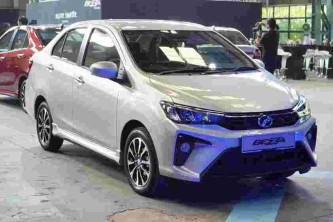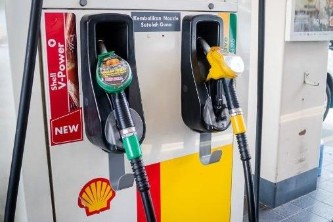fuel additive penrite
fuel additive penrite Related Articles

2019 Proton Persona 1.6L fuel consumption, 5.03L/100 km achievable?
During the Proton 1 Tank Adventure back in 2019, the lowest fuel consumption recorded in the 2019 Proton
What’s the Proton X50’s tested fuel consumption?
Proton claims the X50 returns a fuel consumption figure of 6.4-litre/100 km for the range-topping 1.5
Can fuel additives improve fuel economy and increase horsepower?
Some Petronas fuels, for example, contain the "Pro-Drive" additive.
6-12 February Fuel Price Update: Petrol, diesel up
Fuel prices see a 3 sen increase for petrol and 4 sen increase for diesel.The fuel prices for the upcoming
Bermaz recalls 19,685 Mazda vehicles over fuel pump replacement
Mazda Corporation has announced a worldwide product recall to replace its fuel pump as a precautionary
Ratings – Honda CR-V’s fuel consumption, commendable score
The common knowledge about smaller capacity turbocharged engines is that they are fuel efficient.
How fuel efficient is the Toyota Yaris?
Back then, UMW claims that the new engine was an effort for better fuel efficiency, and the Yaris definitely
Perodua issues fuel pump recalls for 2018/2019 Perodua Myvi
Looks like the Perodua Myvi is affected by the global fuel pump issues as well.
Oil-rich Saudi Arabia bans 16 carmakers for failing fuel standards
roaming the streets of Riyadh and Jeddah.However, even the Saudis realise how important it is to improve fuel
NAP 2020: A lot of buzzwords, little meaning, but the industry can now at least move on
Automated, Autonomous and Connected Vehicles, lightweight material technology, hybrid, electric and fuel
13-19 February Fuel Price Update: Petrol, diesel up again
Fuel prices see a 3 sen increase for petrol and 4 sen increase for diesel.The fuel prices for the upcoming
15 - 21 August 2020 Fuel Price Update: Price increase for all fuel types
It was nice while it lasted, but now the inevitable has happened: both petrol and diesel fuel prices
12-18 December 2020 Fuel Price update: Diesel, petrol up!
This weeks fuel prices continue its upward trend, rising 3 sen for both petrol and diesel.
2020 Proton X70 CKD fuel consumption test, 7.6L/100km possible?
Then the Proton X70’s 60-litre fuel tank was brimmed.Driving behaviour was as per a normal driver
Ratings: Nissan X-Trail 2.0L fuel consumption, slightly above average score
Nissan claims that the rated fuel consumption for the Nissan X-Trail 2.0L is 13.4km/litre, which translates
10 tips on how to save money on your car's fuel cost
Check your tyre pressureThis is the easiest way to save fuel.
A Toyota fuel cell turned the Eiffel Tower green with envy
Power for the lights came from a Toyota fuel cell-powered generator developed by Energy Observer Developments
Did you know that driving on an almost empty fuel tank could damage your fuel pump?
While most of us suffer from empty fuel tank anxiety the moment the fuel gauge drops to 2 bars, some
19-25 December 2020 Fuel Price update: Diesel, petrol up!
This weeks fuel prices continue its upward trend, rising 5 sen for petrol and 3 sen for diesel.
BMW i Hydrogen NEXT gets its fuel cells from Toyota
The only question is, will fuel cell technology catch on with battery?
fuel additive penrite Post Review
Check out Penrite's new fuel additive product for SCR (Selective Catalytic Reduction) systems called PENBLUE. Its... http://t.co/xGR44D5q
fuel additive penrite Q&A Review
How often should you drive your car highway speeds so carbon doesn't build up in the engine?
It doesn't matter, highway or city driving if its built up too the point it can't breathe manifold needs a pull off and clean if. its not too bad you've just lost a bit of power and want to look after your diesel put penrite fuel additive in before you fill it up with a clean tank and see how you go
What do they put in the gas tank of a car that is 90 years old? I'm assuming modern unleaded wouldn't work. What about engine oil? I see Jay Leno driving an old classic car from the 30s around and I was just curious how is that possible?
Modern unleaded fuel will burn just fine in old car engines… I've driven a few Model Ts and own three air cooled VW beetles, the youngest is 50 years old. I'm also a member of the local Veteran, Vintage and Classic car club. The octane requirement for most old engines is very low - they mostly have low compression ratios, designed to avoid any detonation problem at the time they were built. So Lead is not needed for that purpose. The highest octane auto gasoline around 1930 was about 70, so modern fuels far exceed that requirement. (Higher octane ratings than required is no problem, only too-low octane ratings cause problems with detonation). Lead also helps protect valve seats from a problem called VSR - Valve Sear Recession) -which is caused by very hot exhaust valves sitting in seats cut directly into the old "soft" cast iron heads. But the low horsepower of the very early engines did not create enough heat to cause that problem…it came in the 30s as engine power and engine coolant (engines running at higher temperatures) increased the internal temperatures. Tetra Ethyl Lead became a common additive to gasoline from 1922 onwards. For those engines which do need valve seat protection, a product called Valve Saver, containing a compound called MMT - Methylcyclopentadienyl Manganese Tricarbonyl is readily available. The presence of alcohol in some modern gasoline (MOST gasoline in the USA) could be a problem though. Old cars don't have engine computers to adjust the mixture on the run, and alcohol in gasoline will cause the old engine to run a little lean, and hot. Alcohol can also attack some forms of rubber seals. If you can find alcohol free gasoline for your old car, the engine will prefer that. That's no problem here in Australia, alcohol-added petrol/gasoline is not used much here. Lubricating oil is no problem. If it specified 30 weight or 40 weight oil, you can use a modern 20w40 or 20w50 multigrade oil without any problems. The only proviso is that engines with flat tappets (most old engines) used oil with high levels of ZDDP (zinc) as an anti-scuff agent. ZDDP levels have been reduced in most modern oils so you'd need to find one with higher levels (in the USA I think that would include Royal Purple and Brad Penn oils - here in Australia it would be Penrite oils). 1300 ppm or thereabouts is a good number. ZDDP is sacrificial, meaning it gets used up so needs a high level in the fresh oil, so some remains at the point of changing the oil. In fact Penrite In Australia make specialty oils for most of the old vehicles and modern vehicles too, so my modern diesel Isuzu and my 50 year old VW beetle both get just what they need.
What's the difference between "long life" engine oil and "normal" engine oil?
There is extremely strong evidence that longer life engine oils exist and will do the job incredibly well.Nonetheless,clever marketing strategies past and present were designed to confuse and profit! However,ever since engine oils were given Groupings 1,2,3,4,& 5 ,then at least you know if you are buying a Group 3 hydrocracked improved conventional oil or a Group 4 Polyoleofin(PAO) Synthetic or a Group 5 Synthetic Ester.And even a Synthetic blend is described in the classifications.I suggest you download them.And oil filters designed for longer oil change intervals.Like Bosch Distance And performance oil filter.Mobil 1 oil filters have one as well. Today,many car manufacturers have implemented longer engine oil change intervals oil specifications.BMW have one and secondly oils they are registered with the A.P.I and I.L.S.A.C. Or J.A.S.O for motor cycles Download product sheets on the brand of oil you desire and get the ALL the fact ,sheets.It, will show registration for petrol and diesel oils.Eg,Say you want an oil like Penrite:-API 10W-40SN/ C4 GF-5 which are registered with API and ILSAC for suitability with petrol and some Diesel ,engines.There is the new SN PLUS specification Research conserving oil, logo on the container.Some already meet or exceed the new spec and are on the API register. Tribologists have been better oils for years and Mobil who introduced a long life,friction modified conventional oil that would last 40,000km.Moreover,I remember the TV advertisements saying that a car could travel across Australia from East and West,back and forth about 4 or 5 times.Along with Castrol GTX with friction modifiers and liquid Tungsten (WS2).I believe both brands were taken off the market at one point as the friction modifiers in the formula caused bore glazing in newer vehicles and excessive oil consumption on newer vehicles.Friction modifiers were a real issue for concern during their infancy.Furthermore,start up wear on older model vehicles were investigated by numerous engine manufacturers because during the first few seconds of dry start up it created around 70% off all engine wear.Zinc-dialkyldithiophosphate,another Castrol invention reduced the wear dramatically especially when combined with ZDTP.These had exceptional anti wear properties needed for high performance vehicles and those engines built before the the 80’s with flat type tappets and especially O.H.C’s.However,the downside was that too much Zinc and Phosphorus additives could cause Carbon buildup in engine bores and on valve trains. Other ingredients such as Boron and Molybdenum were also used which were called Lubricant Enhancers.But nothing compared to ZDDP/ZDTP .Adding Molybdenum disulfide,a solid lubricant in sub micron sized spheres helped high performance vehicles and extended lifespan of oil.Increasing the TBN or total base number of the oil (its Alkaline Reserve) would be such that it could absorb the acids formed during combustion or from the use of LPG fuel from leaching of the main ,bearings, and to extend the lifespan of oils generally.And since 1994 when the API standard became ,SH,,it was found that too much Zinc or Phosphorus caused the early demise of the Catalytic converter.Adding more Boron to offset these affects did not compare to the protection Zinc and Phosphorus provided to prevent dry start up wear,especially on older model vehicles. However,since 1994 the levels of Zinc and Phosphorus has gradually declined.More so in Europe with more stringent Emissions.Tribologists continue to improve engine protection, longevity and exceed specifications.Synthetic oils seem to be the future in most cases.Regular oil and filter changes are the cheapest insurance!
Is changing synthetic oil necessary only at the mileage intervals, say every 5k miles, or must the time intervals be observed for a seldom-used vehicle? Or is this only for dino oil?
It is possible to use Synlube oil in your engine and just change the oil ,filter periodically.It, contains 5 Synthetic oils and ,n,o mineral oil whatsoever and is supposed to be viable for 150k miles/15 years with the use of sub micron sized particles of Graphite,Molydenum disulfide and P.T.F.E.Or a non Coloidal version without sub micron solid lubricants that’s viable for 5 years.They use an ultra heavy duty construction oil filter with a micro glass fiber which is the elite and better than synthetic medium for holding large amounts of ,debris.,I believe ,it, can filter to 99.6% efficiency and down to 10 microns.Say you used their oil for 10 years then decided to change it then you could send it back for a full refund of the purchase price.Who else gives a warranty on oil ,products? It, reduces fuel consumption,temperature,wear and friction. I am a believer in the 5000km oil and filter change though the base oils of Synthetic oils containing Poly Alpha Olefins and Esters and the five different types never fully degrades ,it’s the additive package that limits Synthetic or mineral oil for that matter.I’ve done a lot of research into engine oil and this oil can be reprocessed and used again.Just as crude oil is made into engine oil! I know that it is possible for synthetic oil to last the lifetime of an automatic transmission in sealed systems and differentials,however,an engine has a lot more byproducts from combustion,moisture,fuel dilution,soot,etc,etc.Moisture is boiled off and eventually byproducts are removed by the oil filter.Microglass oil filters are 3 dimensional and capable of holding more debris without reducing oil flow.And the band of Neodymium magnets placed around the filter perimeter of the body would hold any iron particles to the inside wall of the oil filter reducing the load on the filter medium.I have used magnets around soil,air,fuel and in automatic transmission sumps for years I cannot see any reason why this oil could not do its job as long as oil filters were replaced 4 times ,a, year and then topped up so over a year about 1.2–2.0 Litres of oil would be replaced yearly from the oil filter Changes.And over 3–4 years the oil has a complete replacement.Moreover,I disagree with the oil change intervals Synlube recommends which are far longer and I believe I’d be happier with my own intervals as listed above.It’s the sub micron sized particles of solid lubricants that fill the voids in machined surfaces as well as the orthodox ,conventional additive package and the purity of the 5 Synthetic oils gives it its longevity.Or the same Synthetic oil is available without the sub micron particles with a 5 year warranty.The majority of oil brands refuse to say if an oil is Group 3,4 or 5 oil so most full synthetic oils are a severely Hydrocracked mineral oil which slips under the banner of a synthetic.Brands such as Penrite ,Asain and Synlube State their Synthetic oils aren’t from mineral oil and Penrite and Asain sell a Group 4&5 PAO and Ester engine oil stated as such.Other oils within those same brands clearly marked.Some synthetic brands are advertised and tested for 40,000km intervals and even BMW,Porche,Mercedes Use long life oils.Personally,a year would be my limit though I know these oils can handle contaminants and sludge control much better and Science proves it’s possible but I think the psychological component has stuck where oils are changed every 5,000km though vehicle manufacturers may recommend up to 10,000–15,000km intervals .A throwback from the 1920’s when oils contained no additives and oil quality was poor.Mammoth advances in Tribology in the last few decades so if Synthetic oil technology applied to jet fighter and the enormous passenger jets can keep those engines going under the most hostile conditions then the same technology applied to the modern vehicle engine should be able to increase oil change intervals expedentially.The limit is the price you what are you willing to pay for 5 Litres of engine oil! I have just flushed out a 20 year old low km V6 engine using 4.7 Litres of Synlube flushing oil 5W-50 and drove it for 50km on a new oil filter then drained it.I put on another Microglass oil filter then refilled the oil with Penrite API 10W-40SN/CJ 100% pure PAO & Ester oil with 1800ppm ZDDP/ZDTP and the engine has never been so ,quiet.,It sounds like a brand new engine! Furthermore,I have experimented with Synlube which comes in an API 5W-50SN and an API 5W-40SN for Petrol and multiple fuel engines and a heavy duty diesel oil in the same grades with or without solid lubricants.These grades cover all oil viscosities that fall between 5W and a 40 or 50 grade oil and from SH - SN in Petrol engines.Details are on the website in relation to diesel oils. I have used both the Synlube synthetic oil with and without solid lubricants and changing the Microglass oil filters 4 times a year and topping up the base oil and have found the oil to be outstanding in new and older vehicles.I have used it in new Honda 4 stroke garden equipment and found the engines to have no wear and amazing under all conditions.I cut open and inspect every filter and save the used oil to send back when I’m done.Eventually I will get a U.O.A..For years Tungsten disulfide and Boron has been used to reduce friction in oils since the 70’s but more so with the reduction of Zinc and Phosphorus down to 600–800ppm in newer petrol vehicles..Sometimes we are limited by our own ideas on what an oil should be regardless of sound Science.Like Scientists we try to find fault in the designer rather than the oil.When it’s almost impossible to buy PAO and Ester oils and Group 3 severely Hydrocracked mineral oils are passed off as full synthetics and we are still conned by the oil companies who refuse to say whether their oil is Group 3,4 or 5 on the container. If you decide to buy synthetic oil then change it at recommended intervals because in the end you will still save money when preventative maintenance ensures that engine lasts longer.Once out of warranty you can decide for yourself.Synthetic oils are made for the entire drivetrain of your vehicle and will be reflected in less fuel consumption overall.But if you buy oil in bulk synthetic oils can be so much cheaper!
What kind of impact does a used motor oil have on our environment?
I think it’s disgusting that oils aren’t recycled worldwide.However, back in the 1980’s used engine oil and other Automotive oils were collected and made back into new ,oil.In, one of the Automotive TAFE Colleges I worked in for awhile the thinners from the paint shop was sent to a company that would recycle it back to thinners again.After all crude oil contains thousands of compounds and contaminants that go through fractional distillation processing to produce the various products.Even Synthetic engine oil Group 4 and 5 PAO & Esters can continually be cleaned ,processed and a new additive package used.I know that Synlube make outstanding Synthetic Automotive oils and after you have finished with the oil even 15 years later they will refund the original purchase price and because it consists of 5 man made synthetic oils they can reprocessand a new additive package is added.The man made synthetic base oil virtually lasts forever,it’s only the additives that wear out.I Use Penrite Ten Tenths racing oil as well which is made from 99.99% pure PAO & Ester with around 1800ppm ZDDP/ZDTP,Tungsten disulfide And Boron Synlube which I change twice a year but put 4 Microglass ,10 micron oil filters on yearly which are 99.6% efficient.And Asain also produce a PAO & ESTER man made oil. Considering it may take millions of years for our Earth to make crude oil though oils can be made from gas and coal supplies as ,well.In, any case it’s dumped into land fill and eventually breaks down after many years though these landfill dumps produce gases from many years of dumping all sorts of rubbish which is sold and used to power factories in the area. Conversely,if oils had been recycled from the beginning then the new oil and the price of oil products and fuels would be cheaper and less stress on the environment.But the stock markets are all about greed and supply and demand and little about caring for the ,planet.In, the last 2 years Winter temperatures are 4*C Colder and Summers 4 *C hotter.Normally the highest Summer temperature is 44.3*C but it was almost 48*,C.In, the Australian Outback 55*C is quite common during the last 5 years.You may be aware that oil is mined in open cut mining process from sand containing surface oils in parts of Canada I believe,.It, is cleaned and processed and distilled into petroleum products.Humans tend to live in a disposable world but even steel is dumped instead of recycling all products then breaks down into rusty iron oxide.When I drain my own oil I fill up the 45/ 50x50mm x3 meter long steel fence posts to stop the interior from rusting though the exterior is galvanized and powder coated.And I use the rest to preserve sleeper retaining walls and on the timber roost in the chook shed.Many fleet owners put their oil into a cyclonic cleaner which is spun up to such a high speed that it removes all impurities then reused.Additives are renewed so there are some people rethinking oil wastage.And Bio Diesel is made from recycling fish and chip shop cooking oils which are cleaned the same way before being used as Bio diesel fuel.Many types of seeds are pressed and made into oils and many are suitable for use in Automotive oils and fuels.
 HOME
HOME 


